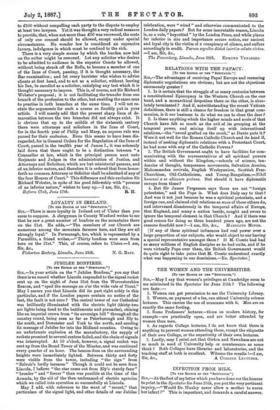RELATIONS WITH THE PAPACY.
[To TER EDITOR OP TIER ..13e8cx,roa."]
Sin,—The advantages of receiving Papal Envoys and resuming diplomatic negotiations are obvious; but are not the objections enormously greater ?
1. Is it certain that the struggle of so many centuries between a constitutional Episcopacy in the Western Church on the one hand, and a monarchical despotism there on the other, is abso- lutely terminated? And if, notwithstanding the recent Vatican definitions, there is still a chance for freedom in that great com- munion, is it our business to do what we can to close the door P
2. Is there anything which the higher minds and souls of that Church have felt so much as the evil of its grasping at the temporal power, and mixing itself up with international relations,—the "sword grafted on the crook," as Dante puts it? Were it not well for the Roman Catholic Church and its head if, instead of seeking diplomatic relations with a Protestant Court, he had none with any of the Catholic Powers?
3. The British Government ought to have facilities for com- municating with the representatives of all spiritual powers within and without the Kingdom,—schools of science, ten- dencies of thought, temperance movements, Salvation Armies, Mahommedan revivals, English Wesleyanism, Scottish Free- Churchism, Old-Catholicism, and Young-Bengalism,—Nffrit humani a se alienunt putans. But should it have diplomatic envoys from these?
4. But Sir James Fergusson says these are not "foreign potentates," and the Pope is. What does Italy nay to that ? And was it not just because he was a spiritual potentate, and a foreign one, and claimed civil relations as none of these others do, and intervened disastrously in the temporal affairs of Europe, that England, and many a nation beside, sought and swore to ignore the temporal element in that Church? And if there was good reason for doing so three hundred years ago, are not the reasons fourfold now P-1 am, Sir, &c., MensiLIUs Maros.
[If any of these spiritual influences had real power over a large proportion of our subjects, who would object to our having a special representative amongst them? If M. Comte had had as many millions of English disciples as he had unite, and if he were virtually Pope over them, the British Government would do quite right to take pains that M. Comte understood exactly what was happening in our dominions.—En. Spectator.]


































 Previous page
Previous page